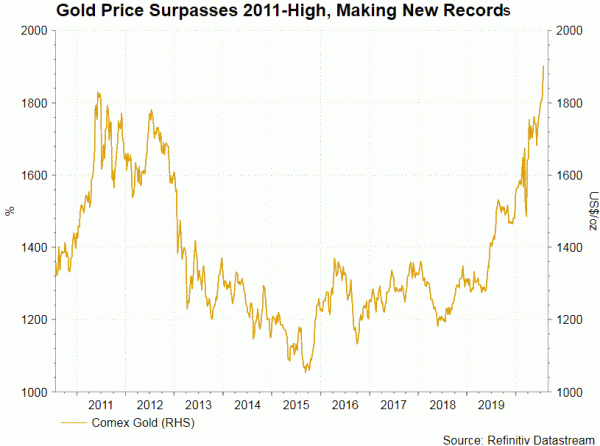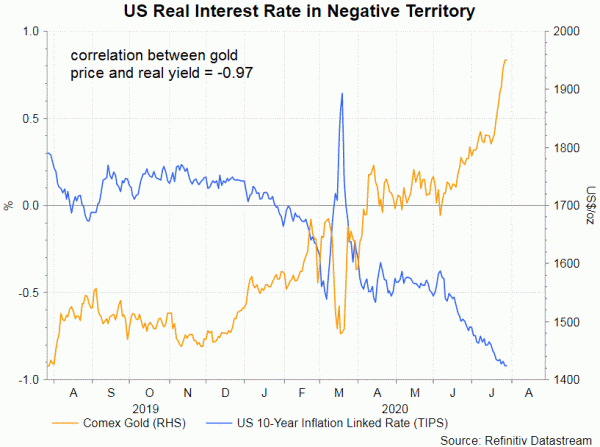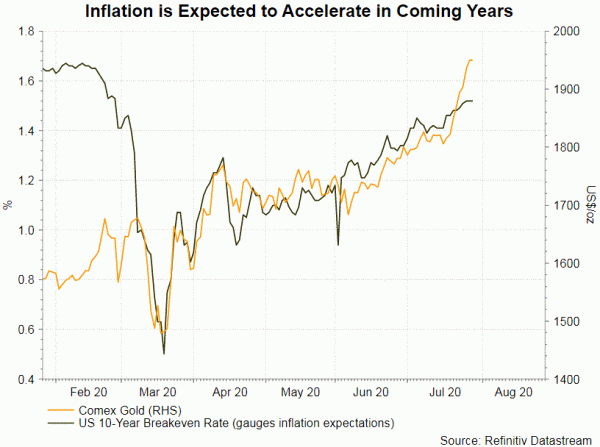Gold’s rally has accelerated with the front-month Comex contract making new highs for two consecutive dates. We believe the recent relentless rally of the yellow metal is driven by a number of factors: low real rates, expectations of higher inflation as a result of ultra expansionary monetary policy and fiscal stimulus and safe-haven demand amidst resurgence of coronavirus cases globally and intensifying geopolitical tensions.
As we mentioned in previous reports, the movement of gold price is highly correlated with US real inflation. Although major central banks have taken a breath after rapid rate cuts in March, global policy rates will likely stay record low levels for the years ahead. In the US, policymakers last month signaled that the Fed funds rate will remain at 0-0.25% at least until 2022. Hopes are rising that the Fed would adjust the forward guidance later this year (probably in September) to signal that the policy rate will be on hold for even longer. Fed’s balance sheet has soared to US$ 6 trillion since announcing QE infinity in March. Officials indicated that asset purchases will have to increase “in coming months”. Prolonged periods of virtually zero policy rate and potential expansion of QE have driven US real interest rates to the negative territory. This is despite Fed’s reluctance to adopt negative rate like ECB and BOJ.

Inflation has remained weak. Headline CPI in the US recovered modestly to +0.75% y/y in June, while core CPI dropped further to +1.19%. Headline and core PCE, Fed’s preferred inflation gauges, stayed at decade-lows of +0.55% and +1.02%, respectively, in May. Ironically, monetary and fiscal stimulus measures in light of current deflationary pressure are raising expectations for inflation in coming years. Heightening inflation expectations are gold positive on the metal’s appeal as an inflation hedge. The chart below shows that gold’s recent rally is in sync with the rise of 10-year US breakeven rate – a gauge of market participants’ expectation of inflation in the next 10 years, on average.
– advertisement –
Undoubtedly, gold’s safe-haven appeal remains in play. There are signs of coronavirus resurgence. The number of cases rose to 16.8M as of July 28, up +2.67M from 7 days ago. In the US, the number of cases has surpassed 4 million. Meanwhile, UK Prime Minister has warned that the second wave may be arriving in Europe while the number of new cases in Spain jumped more than +6K on July 28. This is prone to affect economic re-opening from the lockdowns since March. Separately, US-China geopolitical tensions continue to intensify. US consulate in the Chinese city of Chengdu officially closed on Monday, as ordered by China as retaliation of the US closing the Chinese consulate in Houston, Texas last week. Relations between the two countries have deteriorated since the trade war whcih started in 2016. Tensions have further intensified as the coronavirus outbreak originated in Wuhan, China, has evolved into a global pandemic severely hurting economy in the US and the world. US’ sanctions against China with regards to the latter’s abuse of human rights in Hong Kong have also unnerved Chinese officials. Uncertainties about developments of the pandemic and US-China tensions are supportive of the yellow metal as investors seek safe haven.

 RULE-BASED Pocket Option Strategy That Actually Works | Live Trading
RULE-BASED Pocket Option Strategy That Actually Works | Live Trading This “NEW CONCEPT” Trading Strategy Prints Money!… (INSANE Results!)
This “NEW CONCEPT” Trading Strategy Prints Money!… (INSANE Results!)
